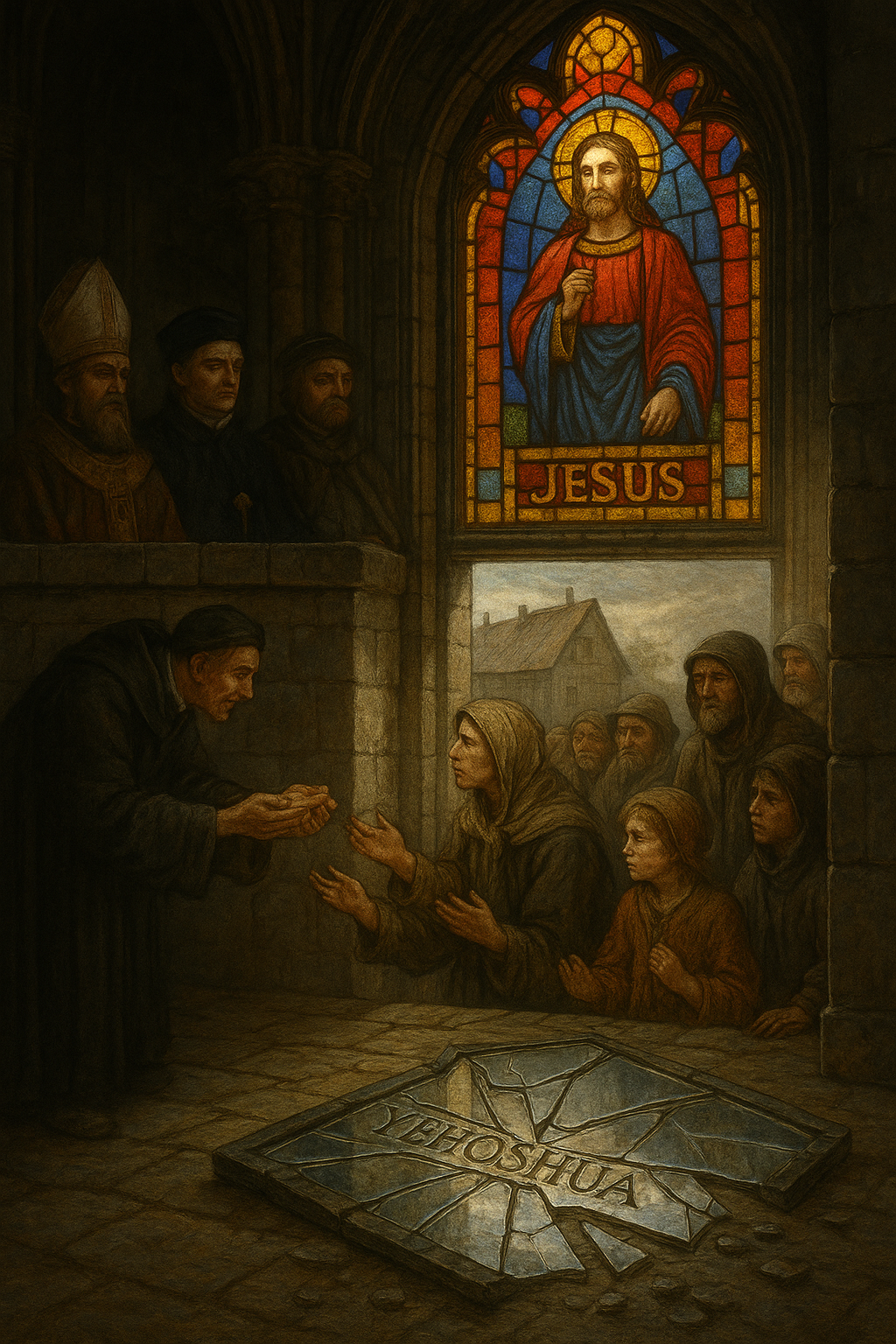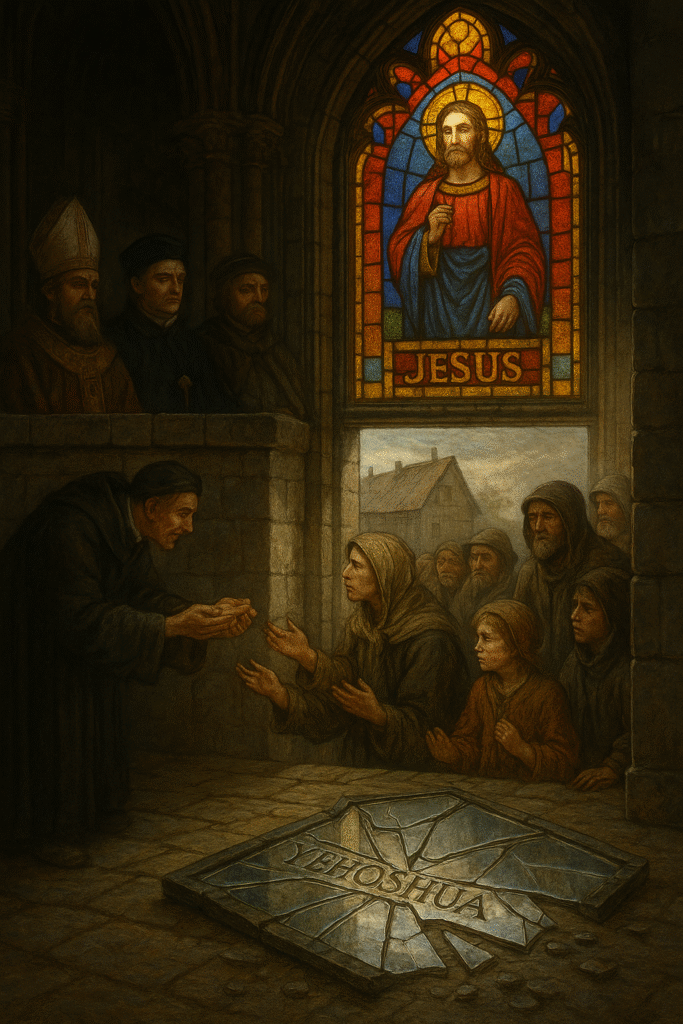Physical Address
304 North Cardinal St.
Dorchester Center, MA 02124
Physical Address
304 North Cardinal St.
Dorchester Center, MA 02124
With Michael Walker
With Michael Walker

To Whom it may concern…

Translation, in its purest form, should be a mirror. When a mirror is placed before you it does not color, distort, or decorate; it simply reflects. The reflection may not be comfortable, but it is true. That is what Scripture was meant to be as it moved from one tongue into another, a pure reflection of the Word as it was first breathed. But the English Bible did not come to us as a mirror. It came to us as stained glass, colored by the designs of men, bent by their agenda, filtered by their ego, and dressed not for the poor, not for adolescents, not for the laborers or the children of the common house, but for the scholars, the courts, the rulers, and the elites who funded its production. And this is not just an accident of history. It is the clear sign of corruption at the root. The English Bible is not simply flawed in style or limited in its language. It is an unsaved source, birthed by men who themselves were not in covenant with Yahweh, men who never called upon the Name above every name, men who served kings who were not saved and institutions that hungered for control.
At the very center of this indictment lies the substitution of the covenant Name. Yehoshua, the Name that carries YHWH within it, the Name that prophesies salvation itself, the Name that holds covenant authority and identity, was stripped away and replaced with “Jesus.” This substitution is not minor. It is not innocent. It is not simply a matter of linguistic drift. It is the undeniable evidence of the condition of the translators. A covenant translator would have trembled to preserve the Name. A covenant translator would have fought for its protection, because they would know that the Name is not a symbol but the very access point of salvation. But the translators of the English Bible did not do this. They carried forward the Latin Iesous into Iesus and then into Jesus, and in doing so they buried the covenant Name. Their very act of translation testifies against them. No one among them called upon Yehoshua. No one among them honored His covenant identity. And because of that, their work itself is the product of an unsaved source.
The historical root of this corruption makes the matter plain. The English Bible was not born in the upper room of Spirit-filled disciples; it was born in the courts of kings. Men who had no covenant, men who saw religion as a tool of statecraft and politics, ordered its production. The translators were not free servants of the Breath but salaried scholars, bound to patrons and institutions, driven by the desire to please rulers rather than Yahweh. Literacy in those days was scarce, which meant that the Word could have been translated simply and directly, so that the first generation of English readers—peasants, servants, the common poor—could finally grasp the living voice of God. But instead the Word was clothed in elevated English, ornate phrases, and Latinate terms designed to dignify the court, not feed the hungry. The Bible was not translated for the shepherd boy or the servant girl. It was translated for the ruling class, for the universities, for the pulpits of men who loved hierarchy. From the very beginning, it was dressed for stained glass, not for the mirror.
Even when we move beyond the covenant Name to look at the texture of the language itself, the same corruption shows through. Take Philippians 2:3–4 as a case study. In the NASB it reads, “Do nothing from selfishness or empty conceit, but with humility of mind regard one another as more important than yourselves; do not merely look out for your own personal interests, but also for the interests of others.” On the surface this sounds precise, careful, respectful. But when you press into it, the language is inflated and abstract. The phrase “empty conceit” comes from one Greek word, kenodoxia, which simply means vain glory—puffed-up nothingness. The phrase “humility of mind” comes from tapeinophrosynē, which is nothing more than lowliness of thought, the posture of a bowed mind. The translation takes visceral, simple terms and dresses them in academic robes. It converts images into abstractions. It speaks not like a letter to brothers and sisters but like a lecture in a hall. Now compare that to a rendering closer to the Greek: “Let nothing be done out of self-seeking rivalry nor out of hollow pride; instead, in the lowliness of a mind bowed rightly, keep on reckoning one another as surpassing yourselves; each of you, do not keep your eye only on your own affairs, but also fix your attention on the concerns that belong to others.” The difference is immediate. It breathes. It feels like it could be spoken in a home, not recited from a pulpit. Strip it down further, and the mirror becomes clear: “Let nothing you do be driven by the desire to elevate yourself at the expense of others, or by a sense of superiority that lacks real substance. Instead, approach one another with genuine humility, valuing their worth above your own. Don’t let your choices be shaped solely by personal gain—be attentive also to the needs and well-being of those around you.” This is plain, adolescent-accessible, and yet it pierces with more weight than all the academic English of the NASB. This shows the difference between stained glass and mirror, and it shows the fruit of translators who served class instead of covenant.
We must call this what it is: malice. It is not innocent scholarship. It is not accidental over-translation. It is deliberate control. Elevated register ensured that ordinary readers would struggle, driving them back into the arms of clergy and scholars. Theological jargon turned simple words into doctrinal categories, creating dependence on experts. Abstraction stripped away the relational imagery that hits the heart and replaced it with cold concepts that sit in the head. And through it all, the substitution of the Name stood as the final seal of corruption. This is not just the history of the past. This spirit of malice is alive today in seminaries, denominations, and publishing houses. New versions are marketed as updates but still carry the same elitist DNA. The stained glass has been polished, but it is still stained glass.
The effects of this corruption stretch across centuries. In the past, peasants were excluded by illiteracy and by language written above their level. Today adolescents are excluded by inflated phrasing and needless complexity. In both eras, the same pattern repeats: translation not made for everyone but made for class. The Bible was never meant for the hungry alone, never meant for the youth alone, never meant for the field or the home. It was crafted for courts, cathedrals, and universities. That is why so many readers today pick up an English Bible and find it hard to grasp. It was never made for them. It was never made for the common soul.
Here is the indictment: the English Bible is an unsaved source. Its translators did not confess Yehoshua. They served unsaved kings. They produced language that reveals their allegiance. A covenant translator would have preserved the Name with trembling and would have translated with the heart of Yahweh, making the Word clear for peasants then and adolescents now. But the English translators did not. They clothed the Word in robes for rulers. They wrote for class, not for community. Their fruit proves their condition. And so the English Bible stands as a witness against itself, carrying fragments of Scripture but stained by man’s corruption. You can see man in it everywhere: narrative control, prestige, hierarchy, agenda, ego. Stained glass, not a mirror.
But the remedy remains, and it begins with returning to covenant clarity. The Name Yehoshua must be restored, for without it there is no salvation, no authority, no covenant. Translation must be reclaimed not as a tool of control but as an act of service. A mirror translation is not lofty but plain. It uses the words of the people, preserves the images of the original, and ensures accessibility even to adolescents. It stands transparent, word by word, showing its sources, using tools like HALOT and BDAG to pull from the root, and applying methods like Cube and Unzip to preserve Hebrew and Greek textures. The test is simple: if an adolescent cannot follow it without aid, it has failed. Yahweh spoke so that fishermen, tentmakers, servants, children, and families could understand. The Word was never meant for a class of scholars. It was meant for all.
And so the call is urgent. The English Bible was birthed by unsaved rulers and scholars, but the Breath of Yahweh is not bound. The mirror can still be lifted. The stained glass can still be torn down. The covenant Name can still be restored. Do not accept the counterfeit of a word clothed in man’s robes. Do not confuse complexity for holiness. Do not submit to the gatekeepers who turn food into ration. Return to Yehoshua. Hold up the mirror. Hear the Word as it was breathed, sharp and plain. For too long man’s corruption has covered the light, but the time has come to expose the unsaved source and return to covenant truth unfiltered, uncolored, unbound.